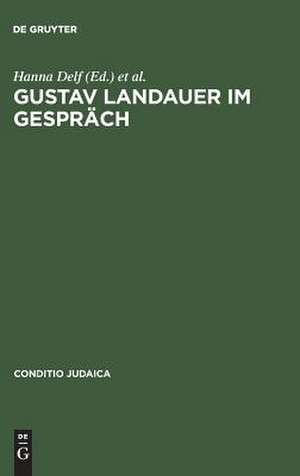Gustav Landauer im Gespräch: Symposium zum 125. Geburtstag: Conditio Judaica, cartea 18
Editat de Hanna Delf, Gert Mattenklottde Hardback – 31 dec 1996
Din seria Conditio Judaica
- 18%
 Preț: 770.29 lei
Preț: 770.29 lei - 18%
 Preț: 779.85 lei
Preț: 779.85 lei - 18%
 Preț: 774.99 lei
Preț: 774.99 lei - 18%
 Preț: 765.61 lei
Preț: 765.61 lei - 18%
 Preț: 1194.25 lei
Preț: 1194.25 lei - 18%
 Preț: 1187.72 lei
Preț: 1187.72 lei - 18%
 Preț: 772.84 lei
Preț: 772.84 lei - 18%
 Preț: 766.16 lei
Preț: 766.16 lei - 18%
 Preț: 777.70 lei
Preț: 777.70 lei - 18%
 Preț: 773.92 lei
Preț: 773.92 lei - 18%
 Preț: 768.86 lei
Preț: 768.86 lei - 18%
 Preț: 766.69 lei
Preț: 766.69 lei - 18%
 Preț: 982.62 lei
Preț: 982.62 lei - 18%
 Preț: 774.99 lei
Preț: 774.99 lei - 18%
 Preț: 775.55 lei
Preț: 775.55 lei - 18%
 Preț: 772.09 lei
Preț: 772.09 lei - 18%
 Preț: 767.60 lei
Preț: 767.60 lei - 18%
 Preț: 768.32 lei
Preț: 768.32 lei - 18%
 Preț: 776.79 lei
Preț: 776.79 lei - 18%
 Preț: 638.12 lei
Preț: 638.12 lei - 18%
 Preț: 1054.18 lei
Preț: 1054.18 lei - 18%
 Preț: 768.15 lei
Preț: 768.15 lei - 18%
 Preț: 770.14 lei
Preț: 770.14 lei - 18%
 Preț: 775.35 lei
Preț: 775.35 lei - 18%
 Preț: 817.31 lei
Preț: 817.31 lei - 18%
 Preț: 774.64 lei
Preț: 774.64 lei - 18%
 Preț: 775.18 lei
Preț: 775.18 lei - 18%
 Preț: 775.18 lei
Preț: 775.18 lei - 18%
 Preț: 775.18 lei
Preț: 775.18 lei - 18%
 Preț: 1265.58 lei
Preț: 1265.58 lei - 18%
 Preț: 772.84 lei
Preț: 772.84 lei - 18%
 Preț: 770.14 lei
Preț: 770.14 lei - 18%
 Preț: 1023.14 lei
Preț: 1023.14 lei - 18%
 Preț: 772.09 lei
Preț: 772.09 lei - 18%
 Preț: 770.14 lei
Preț: 770.14 lei - 18%
 Preț: 775.35 lei
Preț: 775.35 lei - 18%
 Preț: 1119.44 lei
Preț: 1119.44 lei - 18%
 Preț: 771.02 lei
Preț: 771.02 lei - 18%
 Preț: 772.84 lei
Preț: 772.84 lei - 18%
 Preț: 1194.96 lei
Preț: 1194.96 lei - 18%
 Preț: 771.57 lei
Preț: 771.57 lei - 18%
 Preț: 767.79 lei
Preț: 767.79 lei - 18%
 Preț: 769.74 lei
Preț: 769.74 lei - 18%
 Preț: 1046.98 lei
Preț: 1046.98 lei - 18%
 Preț: 772.30 lei
Preț: 772.30 lei - 18%
 Preț: 640.48 lei
Preț: 640.48 lei - 18%
 Preț: 769.23 lei
Preț: 769.23 lei - 18%
 Preț: 765.26 lei
Preț: 765.26 lei - 15%
 Preț: 630.60 lei
Preț: 630.60 lei
Preț: 773.36 lei
Preț vechi: 943.12 lei
-18% Nou
Puncte Express: 1160
Preț estimativ în valută:
147.98€ • 152.67$ • 123.49£
147.98€ • 152.67$ • 123.49£
Carte disponibilă
Livrare economică 06-20 martie
Preluare comenzi: 021 569.72.76
Specificații
ISBN-13: 9783484651180
ISBN-10: 3484651180
Greutate: 0.59 kg
Ediția:
Editura: De Gruyter
Seria Conditio Judaica
Locul publicării:Berlin/Boston
ISBN-10: 3484651180
Greutate: 0.59 kg
Ediția:
Editura: De Gruyter
Seria Conditio Judaica
Locul publicării:Berlin/Boston
Cuprins
Inhalt: Frühe literarische Imaginationen: L. Jäger, Der Herr des Lebens und die Anarchie: Zu Landauers Novelle "Arnold Himmelheber". - T. Regehly, "Stürmische Bekenntnisse." Gustav Landauers literarische Arbeiten. - Literaturhistorische Ortsbestimmungen: B. Witte, Zwischen Haskala und Chassidut. - R. Kauffeldt, Anarchie und Romantik. - G. Mattenklott, "Goethe-Lektüren". - H. Delf, "In die größte Nähe zu Spinozas Ethik." Zu Gustav Landauers Spinoza-Lektüre. - M. Löwy, Der romantische Messianismus Gustav Landauers. - Beziehungen: E. Brieskorn, Gustav Landauer und der Mathematiker Felix Hausdorff. - E. Sturm, "Nicht den Staat wollen wir anbeten, sondern den Geist ..." - M. Matzigkeit, "Ich darf zu Ihnen über alles sprechen, das ist die beste Lockung dieser Zeit." - H.-J. Rothe, "Mein Nicht-Vetter Gustav Landauer." - Politische Versuche: P. Glotz, Der Vordenker der Ökolibertinären. - B. Braun, Die Siedlung: der Beginn des Sozialismus. - N. Seitz, Gustav Landauer und die Münchner Räterepublik. - R. de Jong, Gustav Landauer und die internationale anarchistische Bewegung. - G. Cepl-Kaufmann, Gustav Landauer im Friedrichshagener Jahrzehnt und die Rezeption seines Gemeinschaftsideals nach dem I. Weltkrieg.
